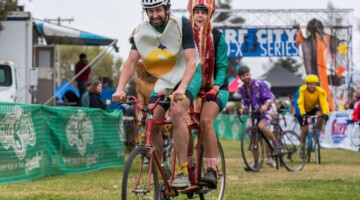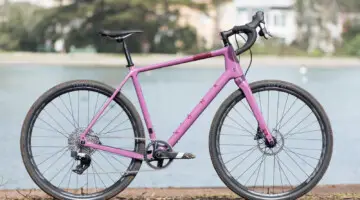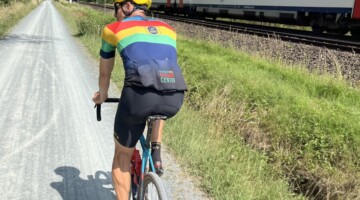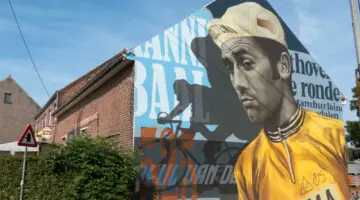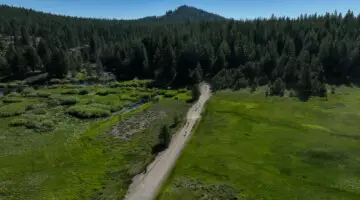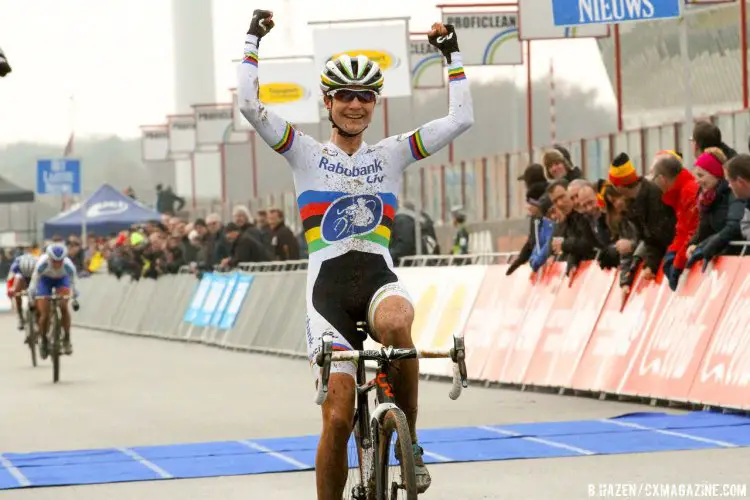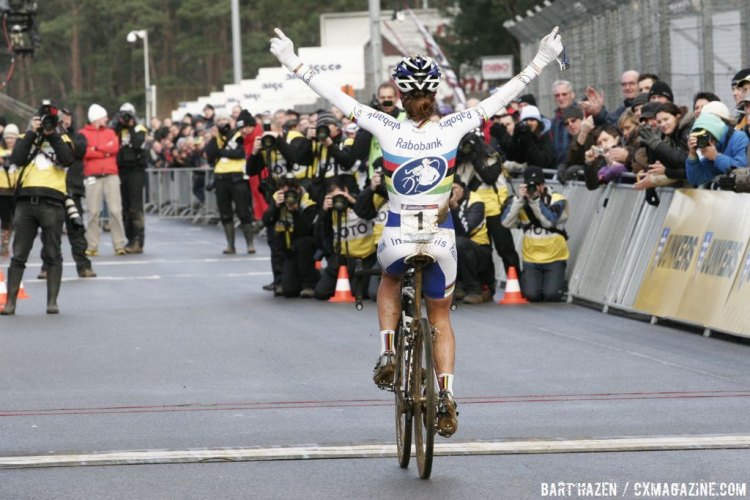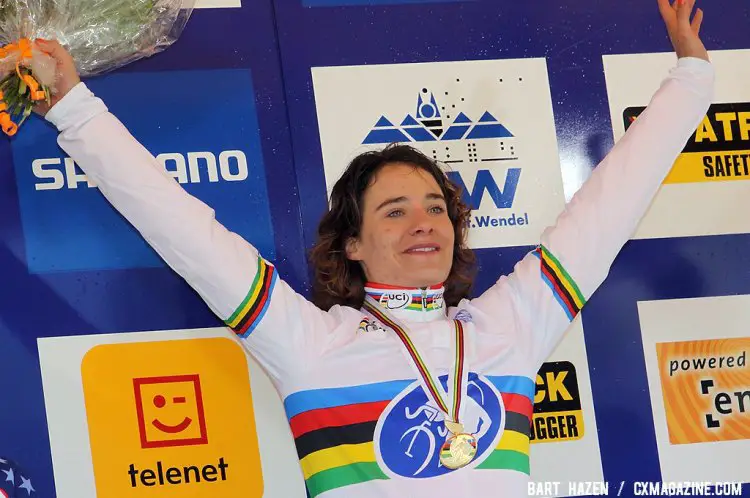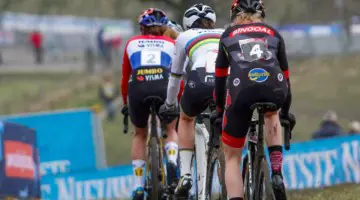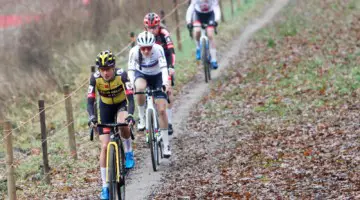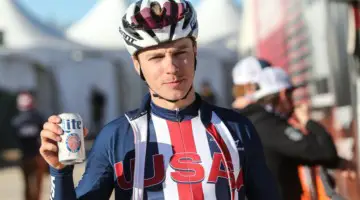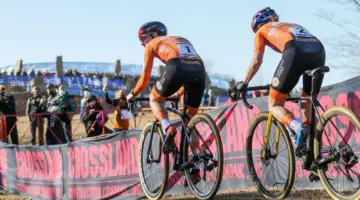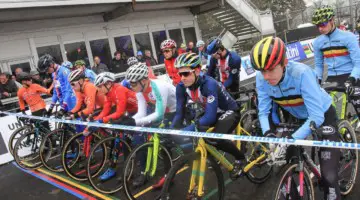On Sunday, seven-time Cyclocross World Champion Marianne Vos will line up in the Olympic Road Race in Rio to defend her 2012 Olympic gold medal.
Vos is back in form entering Rio, having collected seven victories this year, along with a third place on the Champs-Élysées in a sprint finish of La Course 2016.
However, her path back to Rio (and what we hope is a strong cyclocross season) has been a difficult one. Earlier this year, Christine Vardaros sat down with Vos to discuss her comeback, and we’re highlighting this interview as the Olympic Road Race approaches for all of you who missed it during the “offseason.”
A Missing Superstar
As the 2016 Cyclocross World Championships came and went, one face was sorely missed on the Elite Women’s start line. That face is seven-time Women’s Cyclocross World Champion Marianne Vos of The Netherlands. After dominating the sport for so many consecutive years, it was a bittersweet experience to hear her voice at the event but only as a commentator behind a glass window overlooking the start-finish line.
While her presence in the racing world is directly felt by all, her absence from actual competition remains a question mark for many, including Vos herself. “[I] don’t really know the answers either,” explains the 28 year old. “That’s the difficulty for me as well. I want to explain what’s wrong but yeah, what’s wrong…. I just don’t know.”
Vos stepped away from racing, not by choice, but rather due to overtraining syndrome. When the body goes beyond its cracking point from cumulative stress—such as through intense training and racing without enough recovery built into the program, it becomes overtrained. If it stays in this state for too long it turns into a chronic issue, which can result in neurological, mental, emotional, hormonal and nutritional imbalances. This, in turn, can cause an array of side effects such as fatigue, injuries, a dip in performance and results, depression and more.
The Beginning
Vos explains, “It’s not that I decided it’s enough after a couple injuries in a row. But the injuries came from overall fatigue. They [the injuries, ed.] didn’t recover anymore and I also didn’t recover from the trainings. Normally I [could] do three days in a row of long base training with intensive blocks and now I had to recover two days. There was a point where I began to train myself backwards.”
In hindsight, watching her tackle not only a full road season but also cyclocross, track and mountain bike racing year after year, it is maybe not exactly a puzzle as to how the overtraining came about. But turning it around can be a trying situation—a puzzle where all the pieces must perfectly fit together for her to successfully move forward.
The signs of overtraining first appeared for Vos almost 18 months ago, in September of 2014, when she sustained a hamstring injury that sidelined her for the rest of the road season while she took time to fully heal. But three month later, in December, it returned, although not as intense as before. So she figured she could still train. After the Dutch Cyclocross National Championships the following January, it took a turn for the worse.
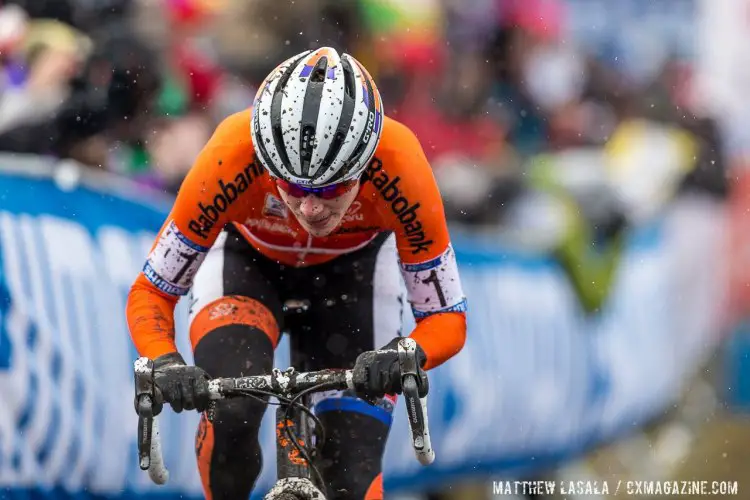
File photo of Vos from the 2015 World Championships in Tabor, which she took on “with one leg.” © Matthew Lasala / Cyclocross Magazine
She then tackled Worlds three weeks later “with one leg” and was happy to snag the bronze medal. “Then I again took a long period of rest to recover that injury and started back up in April [2015] with proper training and buildup for road season,” says Vos. “It didn’t go too badly, but I crashed in a mountain bike race, broke a rib and then got back into racing in May not fully recovered from the broken rib…. But then I also didn’t recover from any racing or any training any longer. So that’s when I said, well this isn’t working and I’m going to try to let my body heal,” she adds.
The final kicker came in July of 2015 when she finally had some medical tests done.
“I wanted to see if I was fully recovered because I felt better. Unfortunately the doctor said well, no, you’re over reached and you need more time. Let’s start with three months.”
The moment news of her overtraining syndrome broke, folks around the world reached out to her for answers. “People asked me a lot, if I was done with racing—if maybe I didn’t want it anymore, or the pressure no more. Or do you want to come back because you still have a contract with your team? Or you want to make money from it? That’s all not the case,” exclaims Vos. “I just love to do it. Period,” she says.
And this—her love for the bike—was the impetus for the long road to recovery she was about to embark on.
Time Away From Racing
Without impending competition, Vos’ focus turned to other aspects of her life—some neglected ones due to her perpetually hectic schedule as well as some new ventures.
“Over the summer [my family and I] moved from one little village to another. It took some time but it was also good because then you have something to get your mind off of other stuff. I also had time to meet up with friends a little bit more often than once every three months,” quips Vos. “In addition, I’ve been doing small things with the team and sponsorship stuff. It felt good to be able to contribute to the team’s effort,” she notes.
Filling up her downtime were newly developed women cyclist empowerment programs such as We Own Yellow, a unique international program launched back in 2013 by Marianne Vos, Loes Gunnewijk, Marijn de Vries and Roxane Knetemann, together with Le Tour Utrecht. Its purpose is to encourage more women of all ages and skill levels to get onto the bike as well as help women further develop in cycling.
Taking it one step farther was Vos’ next project launch, called StrongHer, where pro female cyclists are brought together with women of all skill levels and ages to create something larger than themselves where all riders benefit. This organization has already grown to 300+ ambassadors ranging from grassroots riders to professional. The ambassadors, otherwise known as Sheroes, are located all over the world.
“Everyone was asking me why women’s cycling wasn’t getting the attention it deserves and that I need to put pressure on it. I saw lots of initiatives pop up but they were all small ones that weren’t working together to help each other. That’s why I thought maybe we can try and launch something on a bigger scale to help the women’s cycling movement…to get all the different level of cyclists where everyone can benefit from each other. That’s how StrongHer came about.”
In her extended offseason, Vos personally joined in on some of the organization’s clinics and rides. “I really like to share my passion,” explains Vos. “It also gave me purpose to leave the house instead of sitting around, waiting until I was healthy again. It’s really nice to show people my love for riding the bike.”
A Taste of Post-Career Life
“I’ve been doing a small post-career thing for almost two years now [chuckles]. Actually it was more of a sabbatical. I’ve done some things that I really don’t want as well as some things that I like. Co-commentating on races is something I really like to do, also running clinics, but being on television programs or in fashion shows I don’t really like that much, you know, being in the spotlight besides cycling. I don’t want to do it now or after my career,” says Vos.
With so many post-career opportunities, is Vos swayed a bit from her on-the-bike goals? She surmises, “[s]ome people in my situation would possibly say this is it. I’ll do something else now. As for me, I just want to try and I think I still have the talent and the possibilities so that’s why I want to go for it.”
An Emotional Journey to the Top
It certainly takes a real effort to return to the front of the peloton. In addition to regaining the form that earned her countless top victories, Vos has also been taking this time to strengthen herself in other ways.
“This is the best mental training I’ve ever had, but also the hardest. In the first weeks I had some problems because the goals are gone and you don’t know what to do. I’ve always had not that high self-esteem and when the little self-esteem I had was based on race results then who are you, I thought.”
“I already knew that I am more than just a racer but the positive feedback I always got from others was mostly about racing since I’ve been doing it—and winning—since I was young,” she says.
“And that’s gone now. But then I had to alter my mindset a bit and think, yeah, I’m not racing but I’m still me and let’s make the best of it. I needed to get my confidence now from somewhere else—it now had to come from within. And that’s the thing that I have been constantly searching for these last months,” explains Vos.
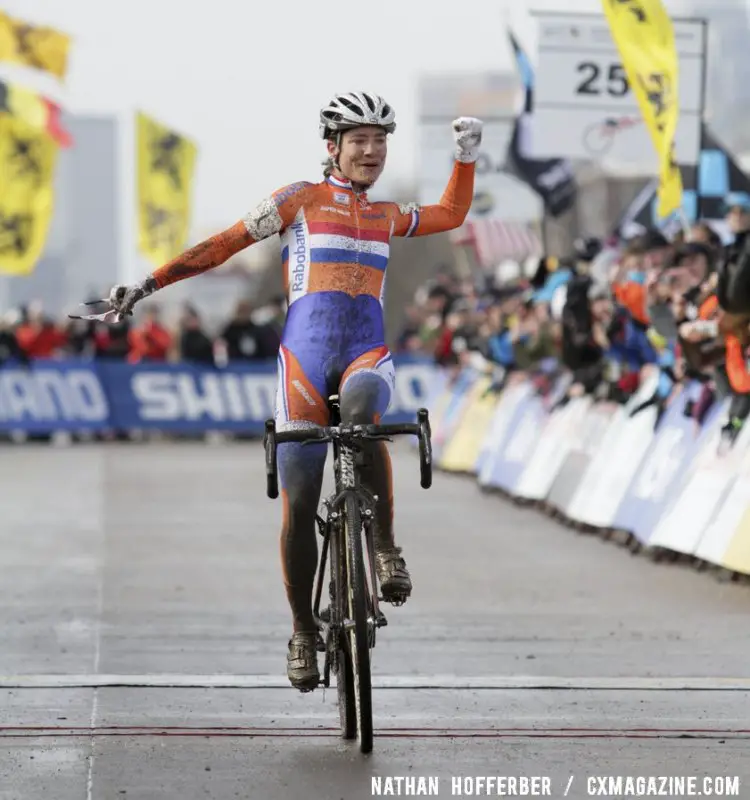
File photo, Marianne Vos won her sixth Cyclocross World Championship with a dominant ride in Louisville, KY. © Nathan Hofferber
Who did Vos find in her search?
“It took time to go from thinking of myself purely as a racer to more than that. But still I’m a lot in the world of cycling. I think this helped me with just being me as a person. And of course it can also possibly help me in my career,” adds Vos.
Re-Entry to Racing and Newfound Introspection
Most cyclists who race almost year-round would go crazy from having to step back from the racing scene for such a long period of time—nine months and counting to be exact, but Vos does her best to balance emotions while moving forward with her newfound introspection and reflection.
“Time off has been a good thing for me, aside from the fact that I hate not racing. Every week I watch the races—of course I love to follow cycling, but part of me remains jealous that I’m not there doing it myself. Makes me also feel very motivated and also sure about what I’ve done. I haven’t done cycling because I had to or somebody pushed me into it but rather because I love riding my bike and I love competition. And when you’re out you don’t take it for granted any longer and you get to the point where you really feel why you want it so badly.”
But why do it? “Why? Not for somebody else, just for myself,” she says, before adding that it’s “[n]ot for my self-esteem but because it gives me so much joy to work for something, to let everything come together for a race, and the satisfaction when it works out and then to do it on the bike, actually something that I love the most is to go out on the bike, be outside and feel free. That has been my biggest motivation and it’s good to see this from an outside perspective a bit more, not being in it and being in the routine—again this race, again this training, again, again.”
Moving Forward Physically
Speaking of training, Vos has recently been given the green light to train again after a long period of time spent doing minimal activity. “I was riding and doing stuff like walks and swims for recovery only. So that’s four times a week about for an hour and a half. I also did core exercises but nothing really tiring to give the body and the muscles enough rest to get back into balance.”
Meanwhile her motivation to get racing again has been going through the roof. Now the body needs to match her enthusiasm. “When you start again, it has to be perfectly built up, slowly,” explains Vos. “Let’s hope that the buildup goes as I hope. I need to keep in mind, though, that it can go not as expected or as hoped.”
“Am I completely healthy?” Vos asks. “This takes a long time. I feel good as long as I’m not doing intensive training but there is a possibility of wearing your body that much out where it doesn’t take a day or a week or a month to recover but rather really long, ages to recover. I hope I’m somewhere between a month and ages. I still have to feel when I am ready. Of course I need to feel myself what is possible. I feel healthy and good but I can’t go out to train like I’ve done the last years—just do five hours on the bike, then the next day three hours on the cyclocross bike. That’s not where I am now. I need to build up really slow.”
At the moment, Vos is in an up-down phase where she trains for two weeks normally before feeling a dip and having to back off from the intensity and duration.
The Possibility of Failure
When asked of she has any fear of failure, Vos is quick to respond.
“Of course everybody has their own struggles and doubts so I have it in the back of my mind that there is a possibility of failure but I’ve always had that since I was 16. As an athlete there comes a time that it’s over. You might get an injury that can end your career. It’s not like you can race until you’re 67,” says Vos.
“I’ve always been aware of that. And maybe it comes closer now, that feeling that the time can be there, but actually I’m not really thinking of it,” explains Vos. “We’ll see. I’m pretty sure I’ll now be able to handle it though if it all goes wrong,” she ponders.
Once Back on Top Again
But if it all goes as planned and she once again crosses the line victorious, can Vos handle that too? “I don’t know. I’ll probably cry. I’m an emotional person but I do not show it that much. But maybe it would come now—that it would be so much emotion that I can’t hold it back. Of course I’m looking forward to the moment I’m racing again but not really focused on what I’ll do when I cross the finish.”
No matter the timing of Vos’ return to glory, one thing is for certain in her world. “I have now a fresh mindset from being out of the racing scene. And now I have to be patient,” she says with a wide grin.
Her ultimate goal this year is to defend her Olympic gold medal on the road at the 2016 Rio Olympics. If her body gives her the green light, she may very well pull it off.





